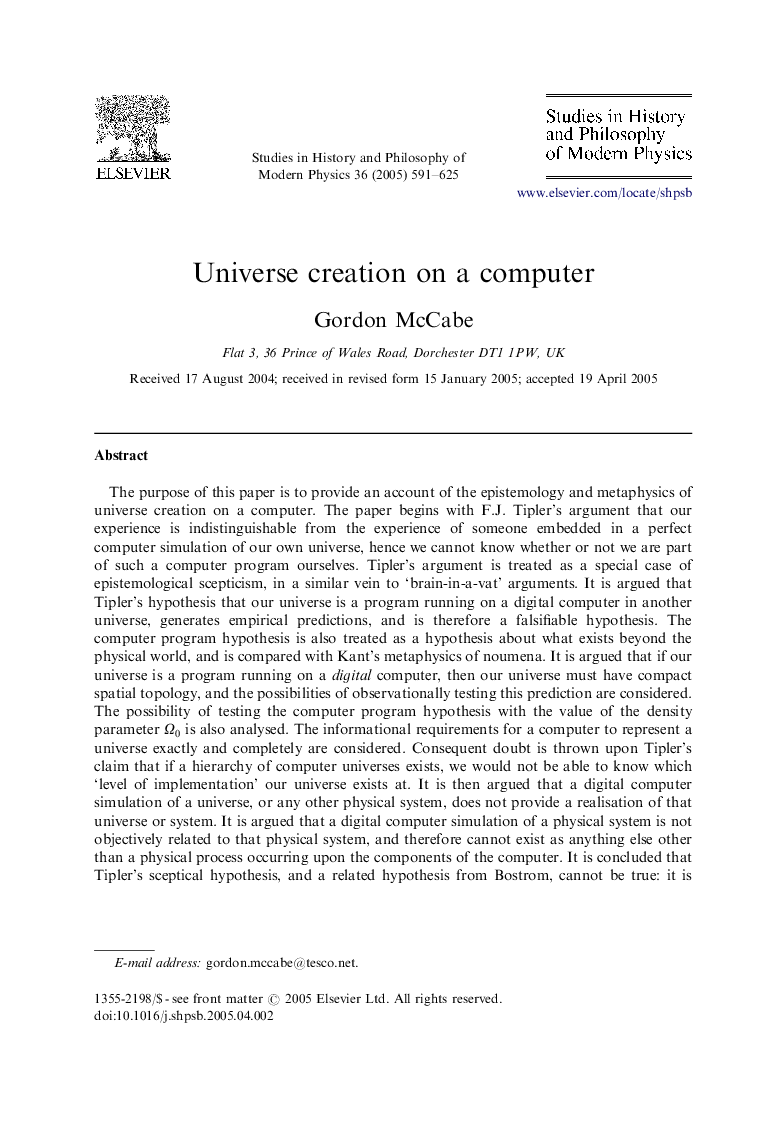| کد مقاله | کد نشریه | سال انتشار | مقاله انگلیسی | نسخه تمام متن |
|---|---|---|---|---|
| 9742818 | 1490467 | 2005 | 35 صفحه PDF | دانلود رایگان |
عنوان انگلیسی مقاله ISI
Universe creation on a computer
دانلود مقاله + سفارش ترجمه
دانلود مقاله ISI انگلیسی
رایگان برای ایرانیان
کلمات کلیدی
موضوعات مرتبط
مهندسی و علوم پایه
فیزیک و نجوم
فیزیک و نجوم (عمومی)
پیش نمایش صفحه اول مقاله

چکیده انگلیسی
The purpose of this paper is to provide an account of the epistemology and metaphysics of universe creation on a computer. The paper begins with F.J. Tipler's argument that our experience is indistinguishable from the experience of someone embedded in a perfect computer simulation of our own universe, hence we cannot know whether or not we are part of such a computer program ourselves. Tipler's argument is treated as a special case of epistemological scepticism, in a similar vein to 'brain-in-a-vat' arguments. It is argued that Tipler's hypothesis that our universe is a program running on a digital computer in another universe, generates empirical predictions, and is therefore a falsifiable hypothesis. The computer program hypothesis is also treated as a hypothesis about what exists beyond the physical world, and is compared with Kant's metaphysics of noumena. It is argued that if our universe is a program running on a digital computer, then our universe must have compact spatial topology, and the possibilities of observationally testing this prediction are considered. The possibility of testing the computer program hypothesis with the value of the density parameter Ω0 is also analysed. The informational requirements for a computer to represent a universe exactly and completely are considered. Consequent doubt is thrown upon Tipler's claim that if a hierarchy of computer universes exists, we would not be able to know which 'level of implementation' our universe exists at. It is then argued that a digital computer simulation of a universe, or any other physical system, does not provide a realisation of that universe or system. It is argued that a digital computer simulation of a physical system is not objectively related to that physical system, and therefore cannot exist as anything else other than a physical process occurring upon the components of the computer. It is concluded that Tipler's sceptical hypothesis, and a related hypothesis from Bostrom, cannot be true: it is impossible that our own experience is indistinguishable from the experience of somebody embedded in a digital computer simulation because it is impossible for anybody to be embedded in a digital computer simulation.
ناشر
Database: Elsevier - ScienceDirect (ساینس دایرکت)
Journal: Studies in History and Philosophy of Science Part B: Studies in History and Philosophy of Modern Physics - Volume 36, Issue 4, December 2005, Pages 591-625
Journal: Studies in History and Philosophy of Science Part B: Studies in History and Philosophy of Modern Physics - Volume 36, Issue 4, December 2005, Pages 591-625
نویسندگان
Gordon McCabe,